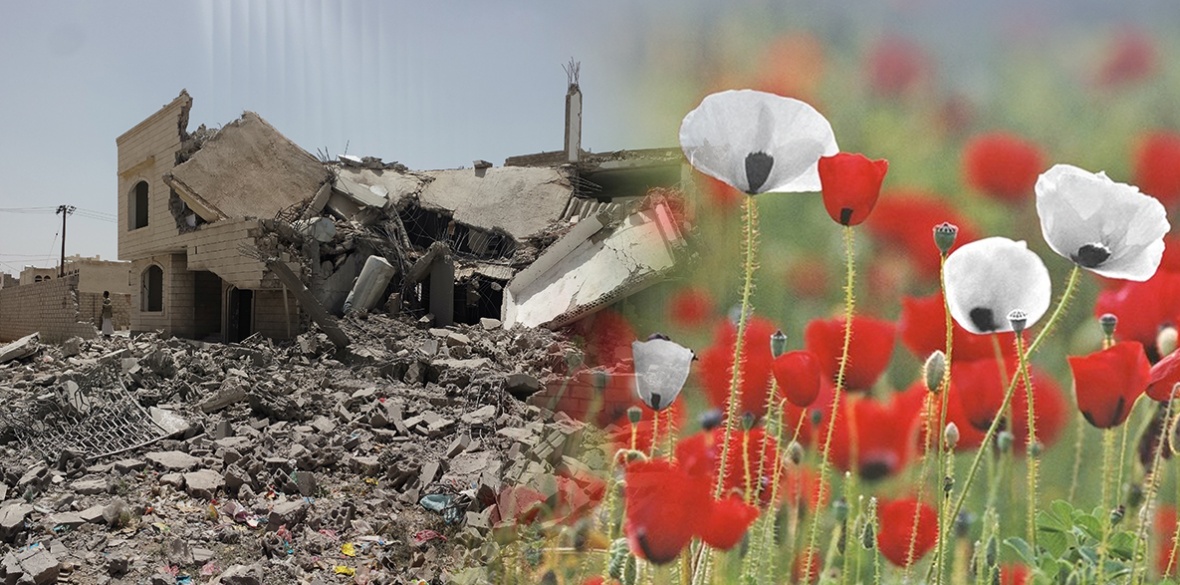This is the last article you can read this month
You can read more article this month
You can read more articles this month
Sorry your limit is up for this month
Reset on:
Please help support the Morning Star by subscribing here
BRITAIN is at war in Yemen. The war has not been declared. There are no British body bags coming back. British forces are not directly dropping bombs on Yemen as they have done in Iraq, Syria, Afghanistan and Libya.
But British troops, ministers and arms companies are playing a major role in this war, just as much as in those other wars that we have protested against in the last 20 years.
The Covid-19 pandemic in Yemen has added to an unimaginable humanitarian catastrophe. With at least 20,000 people killed by war and well over 10 million going hungry, Yemeni health services were already overwhelmed long before Covid-19 arrived. And how do you practise social distancing and other Covid-19 safety measures in a war zone?
When Covid-19 hit Britain earlier this year, many of us were grateful to the people building hospitals and delivering medical supplies, including soldiers. But while some were building hospitals in Britain, others were training Saudi troops who have been bombing hospitals in Yemen.
Saudi pilots have been trained at RAF Valley on Ynys Mon (Anglesey). Saudi officers have trained at Sandhurst. Last month the Ministry of “Defence” refused to release footage of Saudi pilots training at airports in Britain and on the Isle of Man.
Boris Johnson’s ministers boast that Britain has given £1bn in aid to Yemen since the war began in 2015. But in the same time they have allowed the export of arms worth well over six times that figure to countries fighting in Yemen (according to calculations by the Campaign Against Arms Trade, based on the government’s own data). I have heard Yemenis compare this to being offered a sticking plaster by someone who has just beaten you up.
Yemeni anti-war activist Rahdya al-Mutawakel says this situation “represents the triumph of economic interests over the blood of innocent people.” According to the Yemeni group she chairs, the Mwatana Organisation for Human Rights, both sides in Yemen have “demonstrated a clear disregard for civilians.”
When Johnson stands at the cenotaph on Remembrance Sunday, he could lay his wreath — to remember the war dead — at the same time that British-trained Saudi pilots are bombing civilians in Yemen from British-made planes.
We risk making Remembrance Day a festival of forgetting if we do not take the opportunity to remember the people and events, both past and present, who our rulers would rather not talk about.
At the Peace Pledge Union, we are calling for Yemen and all the other forgotten wars to be remembered on Remembrance Day. My colleague Geoff Tibbs, launching this year’s white-poppy campaign yesterday, criticised the hypocrisy of ministers and generals who “Talk of remembering the past while ignoring the present.”
This does not mean that we should forget the past. White poppies are not anti-remembrance. They are pro-remembrance — a broader, deeper and more difficult remembrance than some in the Establishment would like.
The Royal British Legion, producers of red poppies and self-appointed “custodians of remembrance,” argue that remembrance should be about only British and allied armed forces’ personnel.
White poppies represent remembrance for all victims of war, civilian and military, of all nationalities. They also represent commitment to peace and rejection of militarism. They are worn by many people, both pacifists and others, who share these values.
White poppies are distributed by the Peace Pledge Union, a radical pacifist campaign group, although they have been worn since 1933. They were founded by the Women’s Co-operative Guild, a largely socialist group whose members had lost loved ones in WWI. The Guild’s general secretary, Eleanor Barton, called for a commitment to “that ‘Never Again’ spirit that was strong in 1918, but seems to grow weaker as years go on.”
Our focus on Yemen this year is a practical outworking of remembrance: there is little point in remembering something if we don’t do something about it.
There are signs of hope. In August, British soldier Ahmed Al-Babati bravely protested at Downing Street, saying he was no longer prepared to fight in the British army. He was arrested by Military Police and we await news of his fate.
In the same month, the RAF backed down over plans for a new training site in North Wales, following outrage about the likelihood of Saudi pilots being trained there.
In the run-up to Remembrance Day, let’s remember the complexities of the world wars and many others as well.
This year marks the 100th anniversary of the first aerial bombardment of Iraq by British troops: a key moment in the development of aerial warfare against civilians. Colonial atrocities such as these as unlikely to be mentioned by the ministers and generals as the realities of war in Yemen. And as they won’t mention them, we must do.
As we approach Remembrance Day this year, let’s remember — and let’s act.
Symon Hill is Campaigns Manager of the Peace Pledge Union — you can order white poppies at ppu.org.uk.











